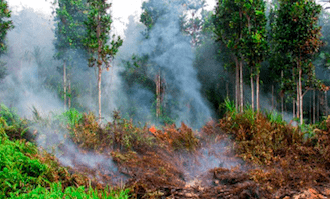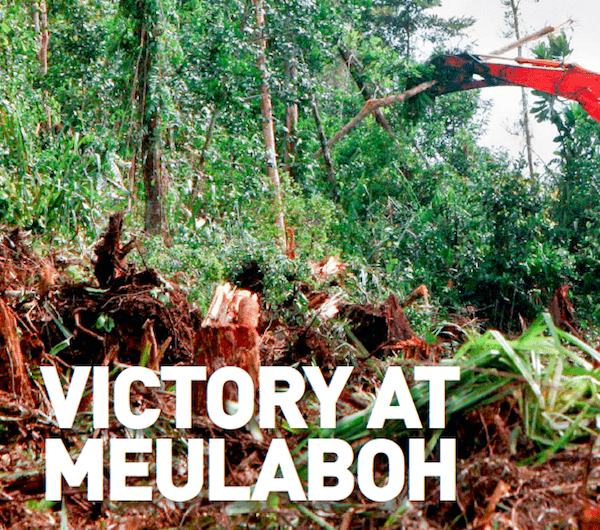The Meulaboh District Court in Aceh has upheld the lawsuit by the Environment Ministry against a palm oil company which set fire to peatlands. This is the first such win.
ON Tuesday, January 8, Sudaryono was very anxious. Several times from early morning he had phoned the prosecutor and lawyer attending the sitting of the Meulaboh District Court in Aceh where a verdict was about to be handed down. By midday, their answer was still the same: the sitting had yet to begin.
“I was like someone waiting to hear whether he had passed an exam,” the Deputy Head for Administration of Environmental Law at the Environment Ministry told Tempo last Wednesday. First scheduled to be held on December 4, 2013, the sitting where the court’s verdict in the Environment Ministry’s charges against Kallista Alam was to be handed down had already been postponed twice. Near sunset, Sudaryono again contacted the team at Meulaboh. This time their answer was more hopeful: “The sitting has already been under way for four hours, but it’s still not over.”
The long-awaited news finally came two hours before midnight. An environmental activist who was attending the trial sent a text message, “Congratulations, the Ministry has won.” Unwilling to wait until morning, Sudaryono asked a staff member to call a prosecutor. “Apparently almost all our charges had been upheld,” recalled Sudaryono.
The panel of judges at Meulaboh District Court had handed down a surprising verdict: they declared that Kallista Alam had broken the law. Its ‘sin’ was to set fi re to an area of peat at Rawa Tripa in Aceh’s Nagan Raya regency. The judges hit the palm oil plantation company with a Rp114 billion fine in compensation.
The Medan-headquartered company was fined a further Rp251 billion to cover the costs of restoring the environment. It was the first civil case ever won brought by the Environment Ministry over forest burning. On his desk Sudaryono still has a stack of files on suspected damage to forests perpetrated by seven other Riau companies whose cases are also ready to be taken to trial. “Hopefully our win in Meulaboh will inspire others elsewhere,” Sudaryono said.
● ● ●
THE charges against Kallista initiated from reports by a number of environmental watchdog organizations to the Presidential Work Unit for Development Monitoring and Oversight (UKP4) in early 2012. They reported the burning of thousands of hectares of peat within the Leuser Ecosystem Area at Rawa Tripa.
Based on these reports, the UKP4 then wrote to the Environment Ministry and the Indonesian Police on April 11, 2012, to advise them. Two weeks later a special meeting was held, attended by representatives of the Environment Ministry, Police Criminal Investigation Department, and the Attorney General’s Offi ce (AGO). That meeting recommended those setting fire to the peat should be taken to court, on both criminal and civil charges.
A joint team was formed, made up of investigators from the Environment Ministry, National Police Headquarters, as well as the AGO. To check the reports, while obtaining their own initial data, the joint team flew to Rawa Tripa three times in May and June 2012. In addition to the joint team, the Environment Ministry assigned two more experts on forest fi res and land damage from the Bogor Agricultural Institute, Bambang Hero Saharjo and Basuki Wasis, to join it.
When they returned to Jakarta, Basuki and his colleagues were not just carrying their notes. They also brought samples of soil, pieces of burnt trees, charcoal, and ash, all to be examined in the laboratory.
“We tried to collect as much data as possible,” declared Cicilia Sulastri, the Environment Ministry’s Assistant Deputy for Dispute Resolution. On November 8, 2012, the Environment Ministry submitted its civil charges against Kallista to the Meulaboh District Court.
Simultaneously, joint investigators also submitted their dossier for the same criminal case to the AGO. The accused was Kallista Alam, as the corporation and entity responsible for opening up the land at Rawa Tripa. Kallista CEO Subianto Rusdi was named as one accused, representing his corporation. Two others were also accused: Setiono (general manager) and Kamidin Yoesoef (estate manager).
Last Thursday Tempo attempted to meet the accused at Kallista’s headquarters in Medan city’s Taman Setia Budi Indah 2 complex. But all three have apparently long been absent. Once Subianto Rusdi was named and accused, Kallista has been run by his son, Palacheta. He was unwilling to be interviewed.
● ● ●
AT the beginning of its dossier of charges, the Environment Ministry revealed that irregularities in the permit for the palm plantation Kallista had been granted at Rawa Tripa. Aceh Governor Irwandi Yusuf issued the new permit for an area of 1,605 hectares within the Leuser Ecosystem Area. He signed the permit on August 25, 2011. But in fact, from 1998, Rawa Tripa had been declared a conservation area.
This permit was also issued after President Susilo Bambang Yudhoyono had issued Presidential Instruction No. 10/2011. In that instruction, dated May 20, 2011, later known as the Inpres Moratorium, the President ordered no further permits to open up peat areas should be issued in the interim. UKP4 Chairman Kuntoro Mangkusubroto at the time also confi rmed that the Rawa Tripa peat area was included in the moratorium map.
The Environment Ministry accused Kallista of contravening the law by setting fire to the Rawa Tripa peat. By reference to the hot spots recorded by America’s NASA satellites, the Environment Ministry suspects this burning had happened repeatedly for three years, from 2009 through 2012.
Burning was carried out on an area of 1,000 hectares of peat—out of the total 1,605 hectares of land permitted to be opened up. The Environment Ministry’s legal representative, Fauzul Abrar, says any burning when opening up land contravenes Article 69 of the Environment Law and Article 26 of the Plantations Law. Kallista, he says, also violated Presidential Decree No. 32/ 1990, which states that all peat lands where peat is over three meters thick are protected.
Kallista’s burning of peat in Rawa Tripa is also considered to have damaged and polluted the environment. Calculations by experts and laboratory simulations estimate the burning of 1,000 hectares of peat released around 13,000 tons of carbon and 4,000 tons of carbon dioxide into the atmosphere.
The burning also damaged the peat’s structure so it can no longer fulfi ll its function of water storage. The usable life of the area is estimated to have been reduced by up to 15 years. Peat areas thousands of years old are unlikely to ever be restored. The Environment Ministry now calculates the losses to the state caused by Kallista’s actions at around Rp366 billion. They include material losses from the damage to and pollution of the environment of Rp114.3 billion, as well the cost of restoration of the environment of another Rp251.7 billion. So that its suit will not all have been for nil, the Ministry did not forget to ask that the 5,769 hectares of land owned by Kallista in West Aceh Regency be seized as a guarantee of payment.
During the trial, Kallista’s legal representative, Luhut M.P. Pangaribuan, presented its defense. He denied the charge that Kallista set fire to the land in Rawa Tripa.
Even though traces of the burning had been found, he said, those could just be from ‘fire jumps’ from areas outside Kallista’s land. Kallista’s lawyer also considered the charges very unclear. The plaintiff was only able to explain one fire on March 23, 2012 in a block covering 29.5 hectares. Whereas, Luhut said, they claimed 1,000 hectares of land had been burnt.
The panel of judges headed by Rachmawati did not just try the case in the courtroom. The judges twice held sittings at the location itself. Examinations on site proceeded on August 28-29 and September 30, 2012. Fauzul Abrar says when the judges first arrived on the site, a fi re monitoring tower had just been built there. A forest fi re-fighting crew, complete with fi re engines and other heavy equipment, were also standing by at the ready. During investigators’ three earlier field verifi cation trips, “None of that was there,” declared Fauzul.
The onsite court sittings, plus the clarifications by expert witnesses put up by the Environment Ministry in the courtroom, were apparently sufficient to convince the judges. They agreed with almost all the charges put forward by the Environment Ministry. The judges only rejected a request that the verdict should be applied, even though it is not fi nal and binding in law, as well as that Kallista should pay penalty interest of six percent from when the case first went to court.
In Jakarta, Environment Minister Balthasar Kambuaya expressed his relief at the decision. “This success is thanks to the good cooperation between all parties,” he said in a press briefi ng last Monday. ● JAJANG JAMALUDIN (JAKARTA), UNTUNG WIDYANTO (RAWA TRIPA), SAHAT SIMATUPANG (MEDAN)

